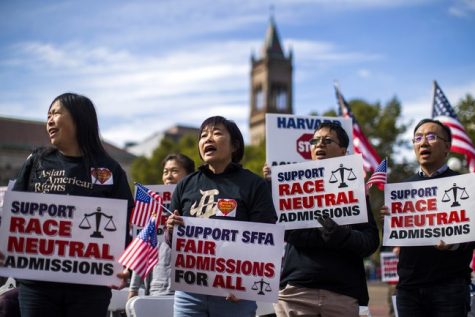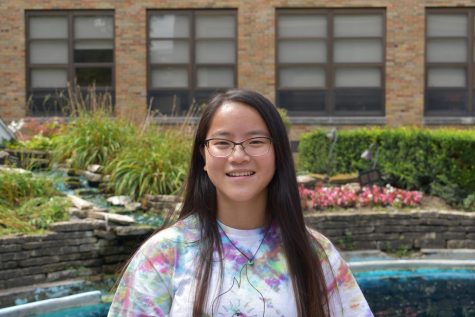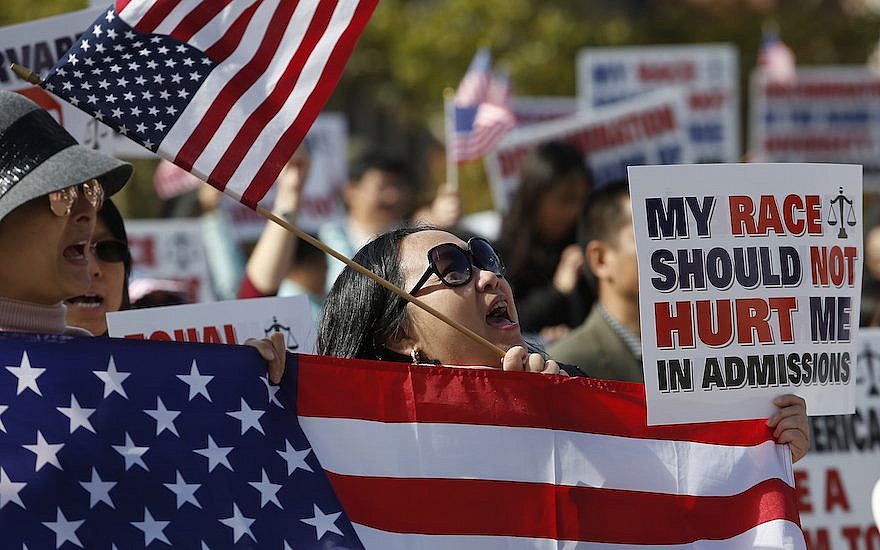Harvard sued for discriminating against Asian applicants
Courtesy of The Times of Israel
Protest have erupted after claims that Harvard discriminated against Asian college applicants.
On Oct. 15 the trial against Harvard University began for potentially discriminating against Asian-American college applicants. It is supposed to last three weeks. The case has interesting implications for high school students as they apply for college and face the effects of affirmative action.
In November 2014, Edward Blum, an anti-race admissions activist, created an organization called the Students for Fair Admissions. They sued Harvard for “alleging that the University discriminates against Asian-Americans and seeking to prevent Harvard College and other colleges and universities from using a wide-ranging and thorough admissions process that considers the whole person”.
Later that spring a group of individuals filed a complaint against the university with the Department of Education and Department of Justice. The Department of Education evaluated the claims and eventually dismissed the complaint during the summer of 2015.
In 2017 the Department of Justice reopened the investigation eventually leading to a trial, and with many believing it will go to the U.S. Supreme Court in a historic appeal. The case is being presented to U.S. District Court Judge Allison Burroughs. It is being brought under Title VI of the Civil Rights Act.

The SFFA wants to eliminate race from the admissions process in colleges.
The trial could be historic if it gets rid of Affirmative Action. Affirmative Action are policies in which an institution or organization engages to improve opportunities for minorities that have been historically excluded.
As a Chinese-American I can see both sides in the trial and it’s hard to say one is right or wrong. Both sides have weaknesses in their arguments, and there are parts of the SFFA’s and Harvard’s argument that I agree and disagree with.
I have been stereotyped my whole life, whether unintentionally or not, and so I can understand why Asians are angry at Harvard for discriminating against them for their personality. Many Asian families have all American stories yet aren’t acknowledged within society. Many of them are families immigrating to the U.S. and working hard so that their kids can have opportunities that they never have had.
I am not saying that these Harvard applicants didn’t work hard to get where they are, but our government and our society has systematically held back African-Americans and Hispanics more so than Asians. Not that Asians haven’t faced racism, but other minorities have had socio-economic equity issues since they came to the U.S and still have them today.
There needs to be some system to equalize the playing field for those that work just as hard as everyone else, but because of where they were born and the color of their skin they immediately have a harder life. That’s where Affirmative Action comes into play.
I agree with Affirmative Action (AA). I feel that AA helps students who have been systematically disadvantaged in society, diversifying colleges and opening up opportunities for minorities. However, I do think that Harvard and other elite colleges may have been discriminating against Asians in this situation.
It’s not surprising why people believe Harvard discriminated against minorities again in their admission process as they did it against Jewish applicants. In the 1920’s until the ’60s, Harvard had a quota for the amount of Jewish students admitted to the school because of fears of driving away white, Christian students and the obvious antisemitism present. Harvard only allowed the Jewish student population to amass to 15 percent of the student population.
“I do think that what has come to light in terms of Harvard’s admissions practices is (and should be) cause for concern among these students, and perhaps all students interested in fairness,” said Mr. Robert Aurich, guidance counselor. “I think that Harvard will likely remain a place that many of our students will continue to apply because of its reputation as an academically strong institution.”
So far from what has been released from the trial it does seem that Harvard at the very least had their admission readers have unconscious biases and stereotypes against Asian applicants.
While everyone has biases and stereotypes, inevitable in today’s society, Harvard’s admission readers’ biases seem to allow them to influence their decision-making.
“There is a certain higher level of expectations that Asians must meet in order to be considered for acceptance,” said Melissa Li, senior. “For Chinese kids in particular, perfect scores and grades mean little to nothing if your [college] essays don’t reflect a brilliant or thoughtful mind.”
Harvard’s admission process ruled out certain Asian applicants based on personality, playing into the stereotype that all Asians are boring, robotic people.
“Harvard evaluators consistently rank Asian-American candidates below White candidates in ‘personal qualities,’” the lawsuit said. “In comments written in applicants’ files, Harvard admissions staff repeatedly have described Asian Americans as ‘being quiet/shy, science/math oriented, and hard workers.’”
“Good grades are almost a requirement for Asian students, not so much as a standout factor,” Li said.
Some Asian applicants had perfect test scores and grades but they were rejected because of their lack of likability in their essays.
Harvard shouldn’t use personality as a factor in their acceptance process. However that doesn’t mean that the SFFA is right in trying to eliminate race completely from the admissions process. Schools nowadays are constantly trying to stay “progressive” and always looking for a way to increase diversity, and that is a plus.
Affirmative Action reminds colleges of the importance of diversity, that by having a well-rounded campus their students will benefit by being around people with different cultures. Today’s world is so complicated and the U.S. is a land of immigrants so preparing young adults before going into that real word would be beneficial to them.
According to the guidance office, in the last five years, 137 Central students have applied to Harvard, and of the 137 only seven were accepted. A number of them have been Asian because of the 17 percent Asian population at the school. So it will be interesting to see where the court lands with it’s decision, how colleges and high school students respond, and how it impacts future applicants.

Lia Reichmann, senior, is well versed in anything to do with Friends, Harry Potter, and sports. She likes to go backpacking and taking photos (follow @liareichmann_photography...















